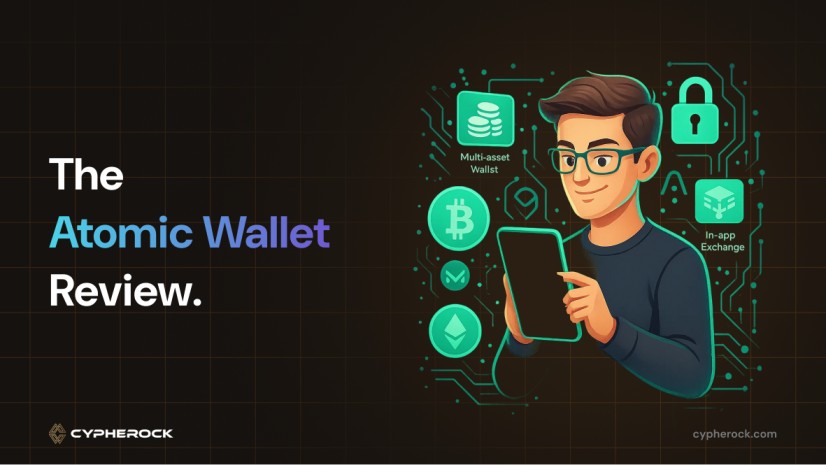

You’ve probably heard about Atomic Wallet if you use crypto or are thinking of starting. Since its launch in 2017, Atomic Wallet has become popular, supporting more than 1,200 cryptocurrencies. Many users enjoy its easy-to-use interface and decentralized nature. But after a huge security breach in 2023, you might wonder if Atomic Wallet is still safe for your digital assets.
The most important thing for a crypto wallet is keeping your crypto secure. You need a wallet that lets you fully control your private keys so your assets stay safe. Is Atomic Wallet really secure? Is it reliable enough for everyday use? How easy is it to use for someone new to crypto? These are the questions we'll answer in this review.
Atomic Wallet is a decentralized crypto wallet. It began in Estonia in 2017 as a desktop wallet but soon added mobile versions. Atomic Wallet aims to provide a secure, easy-to-use way to manage cryptocurrencies. Its core values include privacy, decentralization, and ease of access.
Since launching, Atomic Wallet has grown significantly. It now has over 10 million users worldwide and more than 5 million app downloads. This growth is mainly due to its user-friendly design and support for many cryptocurrencies.
Atomic Wallet supports a wide variety of cryptocurrencies. Popular coins include Bitcoin (BTC), Ethereum (ETH), Binance Coin (BNB), and Solana (SOL). Overall, it supports tokens across ERC-20 (Ethereum), BEP-20 (Binance Smart Chain), and TRC-20 (Tron) networks.
If you want to store tokens that aren't listed by default, you can manually add ERC-20 and TRC-20 tokens by sending them to your wallet address. This gives you more flexibility with your crypto investments.
Atomic Wallet supports over 60 blockchain networks, including:
You can find the complete list on Atomic Wallet's supported assets page.
Atomic Wallet makes it easy to buy crypto directly with your bank card. This is called crypto onramping. Atomic Wallet partners with Simplex to help you buy crypto instantly.
However, buying crypto through Atomic Wallet has high fees. You pay around a 5% fee on every purchase. You also must spend at least $50 each time you buy crypto.
One cool feature of Atomic Wallet is staking. Staking lets you earn extra crypto by locking up your coins. Atomic Wallet supports staking for over 20 tokens, with annual rewards (APYs) as high as 20%.
Popular coins for staking include:
You choose how many coins to stake, and rewards are automatically added to your wallet regularly.
Atomic Wallet has its own token called Atomic Wallet Token (AWC). This token provides benefits like:
Atomic Wallet includes a browser extension to help you interact with Web3 decentralized apps (dApps). You can use DeFi platforms like Uniswap, PancakeSwap, and even manage NFTs.
This Web3 feature helps you explore new crypto opportunities and digital collectibles easily.
Atomic Wallet lets you instantly swap over 100 token pairs without leaving your wallet. The built-in swap feature is user-friendly and fast.
You can also earn cashback rewards when you swap tokens if you hold enough Atomic Wallet Tokens (AWC).
Atomic Wallet tries to keep your crypto secure with local encryption. Your private keys and 12-word recovery phrase stay on your device, which reduces hacking risks.
However, Atomic Wallet's security faced a huge setback in 2023. Hackers stole around $100 million in crypto from thousands of users. Some people lost millions of dollars each.
Atomic Wallet faced major criticism for not communicating clearly about the hack. Users had to move funds themselves to protect what remained. This incident raised doubts about the wallet’s security setup.
Since the hack, Atomic Wallet has improved security by introducing regular updates and alerts. But its closed-source nature means users can't fully verify its safety.
For stronger security, consider Cypherock X1. It secures your crypto by splitting your private keys into parts. Even if one device is compromised, your funds remain safe. This makes it much harder for attackers to access your crypto.
Atomic Wallet charges two main fees you should know about:
There are no extra wallet fees for deposits, withdrawals, or staking. But you will pay network fees depending on which blockchain you use. For example, Ethereum has higher fees (around $1-$50), while Solana fees average just $0.02.
Atomic Wallet's mobile app is simple and easy to use. It has millions of downloads and gets high ratings for usability. You can check your balance, swap tokens, and receive notifications when transactions happen.
The desktop version works smoothly on Windows, macOS, and Linux. It is user-friendly and regularly updated for improved security and performance.
Here’s how to start using Atomic Wallet:
Atomic Wallet offers customer support through email, social media, and a help center. But there’s no 24/7 live chat, so urgent issues might take longer to fix.
Overall, users have mixed feelings about the support provided, especially during the hacking incident.
Atomic Wallet is convenient for managing multiple cryptocurrencies, but it falls short in security. Here’s why Cypherock X1 might be better:
Atomic Wallet might still work if you prefer convenience and have small crypto amounts. Its staking and Web3 features offer useful ways to manage crypto.
But the 2023 hack and closed-source software raise serious security concerns. If security is your priority, Cypherock X1 is a much safer choice. With decentralized key storage, you can confidently protect your crypto assets.

Ready to protect your crypto like a pro?
Check out how Cypherock X1 can help you secure your future - Explore now!.
Connect with us:
Twitter: @CypherockWallet
Telegram: Join the Community
